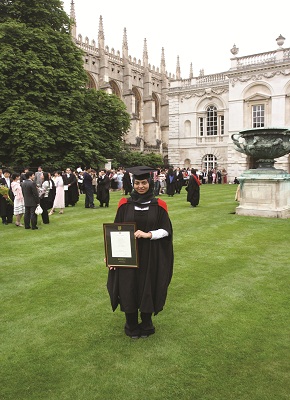|
|||||||||||
Imagine a computer that knows how you feel. The computer would be able to detect your mood and make decisions based on that. If the computer infers that you are in a bad mood, it would not pop up virus warnings all the time. It can alert you if you are falling asleep while driving, sense if you are frustrated when you cannot find what you are searching for on the Internet, or switch to a type of music that would cheer you up when you are feeling down. Pioneering this research is Rana el Kaliouby ’98, ’00, research scientist in the Affective Computing Research Group at the Massachusetts Institute of Technology (MIT) Media
“The field is relatively new, but is growing rapidly,” said el Kaliouby, who received a standing ovation at the recent TEDx Cairo event where she spoke about affective computing. “It’s a great combination of computer science and psychology.” Since her graduation from AUC with a bachelor’s and master’s in computer science and a double minor in business administration and electronics, el Kaliouby has continuously hit new heights. She earned her doctorate in computer science from the University of Cambridge, and her doctoral dissertation on mind-reading machines was nominated for the British Computer Society Distinguished Dissertation Award for breaking new ground in the field of affective computing. She is the 2006 recipient of the Higher Education and Learning Institutes Gold Award from the Global Women and Inventors Network. Her postdoctoral research, the first in the world to tackle the development of a social-emotional wearable system for autism spectrum disorders, was rated by The New York Times as one of the top 100 innovations of the year in 2006. She has presented her research at Google, Royal Society and other prominent institutions, and her work has been featured in Reuters, CNET, Slashdot, BoingBoing, Wired and New Scientist magazines, as well as The Boston Globe and The New York Times. As part of her doctoral work at Cambridge, el Kaliouby developed a computer system that can determine whether a person is interested, confused or focused by detecting facial and head movements through a Webcam or wearable camera. Her research at MIT integrates this system into the Interactive Social-Emotional Toolkit (iSET), a technology mainly aimed at helping individuals on the autism spectrum improve their communication skills by more accurately detecting the social cues of others. “People vary in their emotional intelligence skills and their ability to ‘read’ non-verbal expressions of others,” el Kaliouby said. “With autism, these conditions lie at an extreme end of the spectrum.” Consisting of a tiny video camera, an earphone and an ultramobile computer, the device can be easily worn by users to help detect the moods of those around them. A pilot study is underway to test the technology with a group of autistic teenagers at the Groden Center, a school for autism spectrum disorders in the United States. The study is part of a larger U.S.-funded initiative at MIT that also involved Abdelrahman Mahmoud ’10, computer engineering graduate of AUC; Youssef Kashef ’10, electronics engineering graduate of AUC; and Mish Madsen, MIT graduate student. Supervised by el Kaliouby, along with Professor Rosalind W. Picard and Professor Matthew Goodwin at MIT, the project won first prize at the 11th International ACM SIGACCESS Conference on Computers and Accessibility. Although iSET is being used to help those with autism, some have joked about using it as a dating device, El Kaliouby’s interest in the field was sparked when her husband, Wael Amin ’93, ’06, founder and president of ITWorx, gave her a book titled Affective Computing by Rosalind W. Picard, founder and director of the Affective Computing Research Group at the MIT Media Laboratory. El Kaliouby was pursuing her master’s in computer science from AUC at the time. “I was inspired by the book, which dealt with how computers should be emotionally intelligent,” she noted. “I decided that this was what I should concentrate on in my studies so I started building a computer that reads people’s emotions through the face, which is one of the most powerful means of communicating your feelings. By the end of my graduate studies, I was able to create a prototype of a simple computer system. Six years later, el Kaliouby met Picard during her doctoral dissertation at Cambridge. The two joined forces, and el Kaliouby became a research scientist at MIT. Dividing her time between Egypt and the United States, el Kaliouby conducted research on the measurement of user experiences, human-computer interaction, personal robotics and learning contexts. In addition, she is actively engaged in the Autism and Communication Technology initiative at the MIT Media Laboratory, one of the first research centers around the world that combine research in autism theory and technology. Hoping to get more students inspired to conduct research in this area, she also co-taught the first Autism Theory and Technology course with Picard and two other MIT professors. With growing interest in the applications of affective computing, Picard and el Kaliouby co-founded Affectiva, Inc., a spin-off from MIT’s Media Laboratory, to measure and communicate emotions. Their first product is a small, wearable sensor that measures one aspect of emotions. “We will start selling our technology for people with autism as well as for market research to measure people’s responses to content like soccer matches,” explained el Kaliouby. “My dream is that this technology becomes widespread and is used for helping others.” Throughout her career path, el Kaliouby found tremendous support from her husband. While still a newlywed, she received her acceptance to the University of Cambridge as a doctoral candidate. Torn to be leaving In addition to her family, el Kaliouby found support from her AUC professors, who testify to her hard
|
|||||||||||
